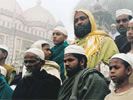Eye For Film >> Movies >> The Clay Bird (2002) Film Review
A young boy, Anu, is taught how to brush his teeth by an old man as people pray to Allah. A young girl, Asma, plays alone in her garden as a mill pounds repetitively in the background. The threat of civil war hangs over the heads of Kazi, his wife Ayesha and younger brother Milon. All are part of Bangladesh under military rule at the end of the Sixties.
Anu (Nurul Islam Bablu) has been sent by his father to a strict Islamic school to teach him to become more religious. Kazi (Jayanto Chattopadhyay) is afraid that too much contact with Milon has led the boy away from the true path. At school, he is told that his name is not a good Islamic name, to the amusement of the other pupils. He is befriended by Rokon (Russell Farazi), the weird outsider.

Together they brave hardline teachers, who believe that prayer is better than sleep, as well as meeting the more progressive Mr. Ibrahim, who challenges the sanity of transferring practices directly from the Middle East to Bangladesh.
All the time he is away, Anu's family is dying: his sister in body, his mother in spirit and his father in faith. When the worst happens and war comes to their village, Kazi cannot believe that Muslims would attack Muslims and so remains a broken man, whilst Anu and his mother leave in the hope of a better life.
The Clay Bird is filled with great splendour and majesty. Tareque Masud has managed to make a film that presents an intelligent analysis of what is means to be a Muslim. The choice of locations and attention to detail is amazing. Anu's school is a place of decaying beauty, with intricate carved staircases being gradually reclaimed by nature. The browness of the city contrasts with the bright colours of the village. The views of the selfless Sufi Muslims, who believe in Islam through knowledge instead of arms, are told through song.
The Hindu festivals are seen as a liberating experience and the ultimate corrupting influence. All the characters represent a different point on the spectrum of Islam, even the boatman.
Film posters on a wall reflect a separate time, one in which - as the boatman tells us - Anu's father was as liberal as his brother.
With beautiful performances by the young actors and a resonance which stretches far beyond the boundaries of Islam to other religions, this is a film that will leave you both shattered and yet a better person for having experienced it.
Reviewed on: 10 Aug 2002

















